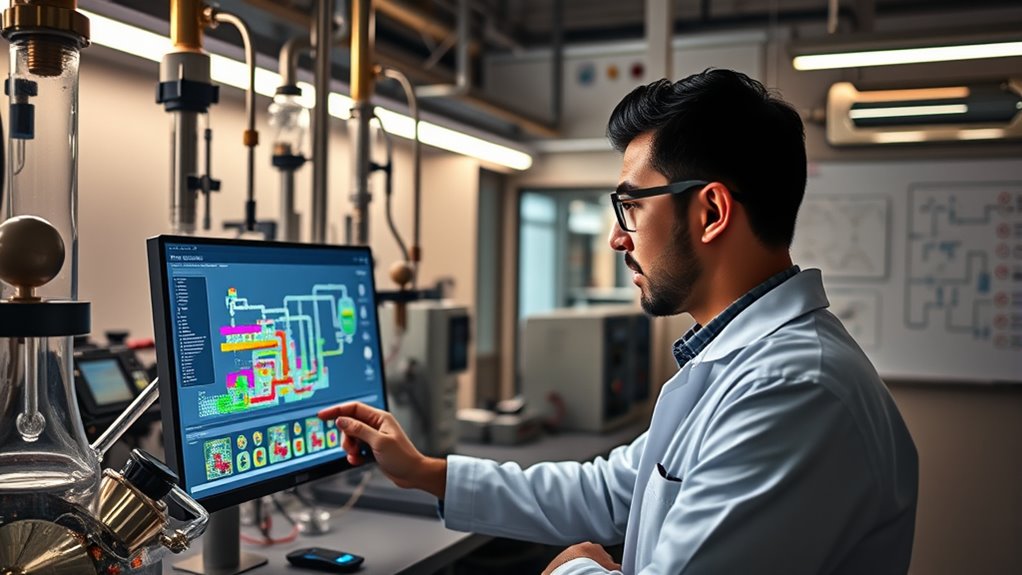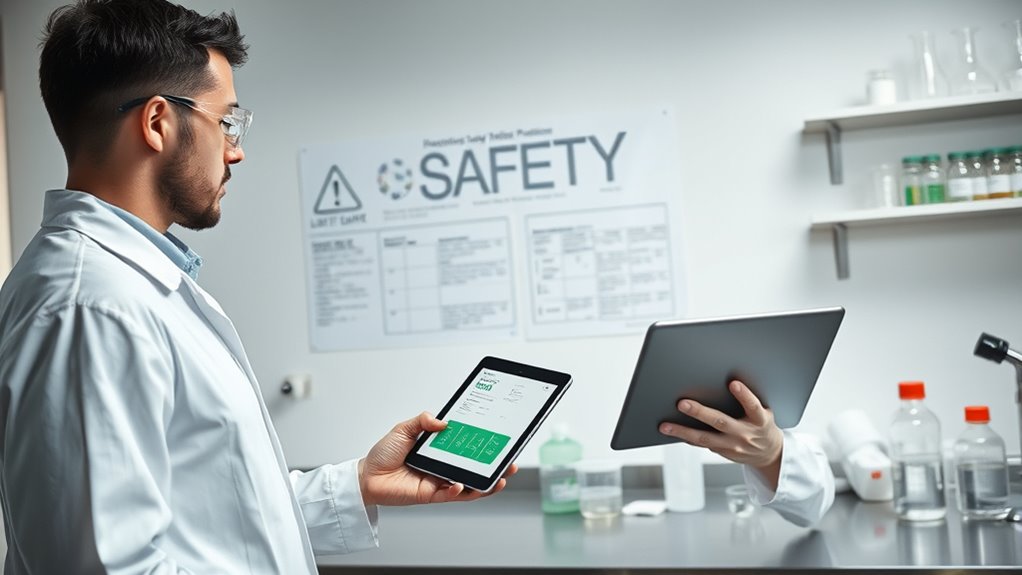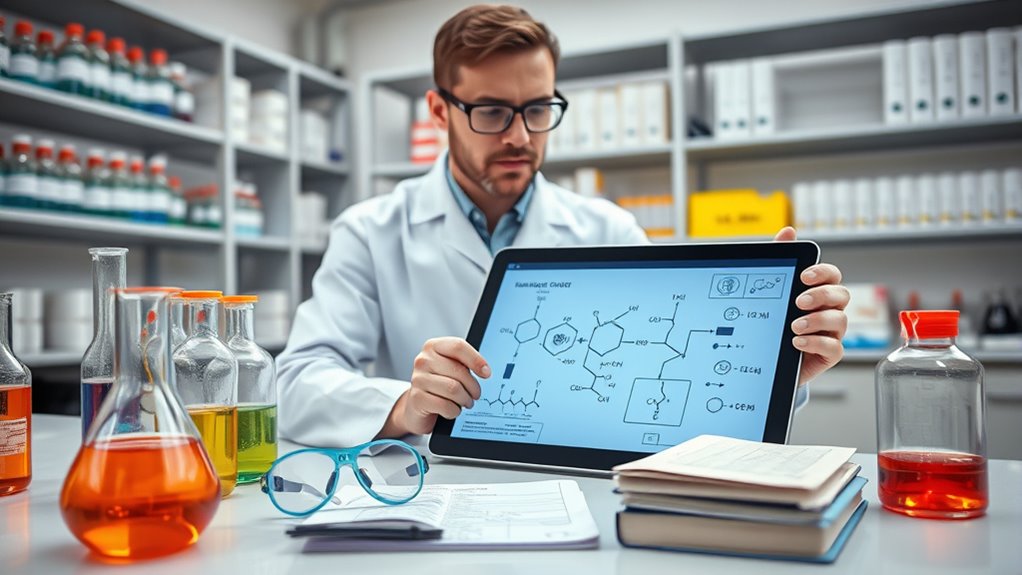To prepare for a chemical industry technical interview, research the company’s projects, industry trends, and safety standards. Review core engineering principles like thermodynamics, fluid dynamics, and process optimization. Practice explaining your experience with process simulation tools like Aspen Plus or HYSYS. Be ready to discuss sustainability efforts, safety protocols, and your role across different sectors. Developing clear examples of teamwork and problem-solving will boost your confidence—continue exploring these strategies to stand out in your interview.
Key Takeaways
- Review core chemical engineering principles, including process design, thermodynamics, fluid dynamics, and process control systems.
- Practice technical questions on flow control, piping, pump efficiency, and environmental impact assessments.
- Familiarize yourself with process simulation tools like Aspen Plus, HYSYS, and gPROMS for modeling and troubleshooting.
- Understand industry trends such as sustainability, decarbonization, and innovations in R&D and digitalization.
- Prepare STAR-based examples demonstrating teamwork, safety initiatives, problem-solving, and ethical decision-making.
Conduct In-Depth Company and Role Research

To succeed in your chemical industry interview, you need to conduct in-depth research on the company and the role. Start by analyzing current industry trends, like sustainability initiatives and technological advancements, to understand the company’s strategic focus.
Review how they incorporate innovations such as data analytics or emerging technologies like nanotechnology into their R&D efforts. Familiarize yourself with the company’s approach to sustainable practices, including environmental impact reduction and stakeholder engagement. Understanding effective strategies for sustainability can also provide insight into their corporate priorities.
Study their corporate culture, core values, and commitment to safety, employee growth, and community involvement. This knowledge helps you align your skills with their expectations and demonstrates genuine interest.
Deep understanding of the company’s position within the competitive landscape ensures you’re well-prepared to discuss how you can contribute to their ongoing success. Additionally, exploring diverse design options for internal processes can provide insight into their flexibility and innovation mindset. Reviewing industry-specific regulations can further prepare you to address compliance and safety considerations relevant to their operations.
Review Common Technical and Behavioral Questions

Reviewing common technical and behavioral questions is essential to building confidence and demonstrating your suitability for a role in the chemical industry. Technical questions may cover topics like flow control, where you might explain managing fluid systems with valves and pumps, or discuss piping considerations for slurries, including material choices and pressure management. Understanding key traits of successful quality assurance engineers can also help you stay organized and create a comfortable environment for study and preparation. You could also be asked about pump efficiency calculations or the environmental impact assessed by wet bulb globe temperature. Additionally, it’s helpful to familiarize yourself with inspirational quotes about fatherhood, as they often emphasize guidance and support, which are valuable qualities in team settings. Behavioral questions often focus on handling project delays, resolving team conflicts, or working under pressure. Be prepared to share examples of process improvements, ethical decision-making, or safety initiatives. Practicing these questions helps you articulate your experience clearly and shows interviewers you’re ready to handle industry-specific challenges effectively.
Brush Up on Core Chemical Engineering Principles

Understanding the core principles of chemical engineering is essential for designing efficient and sustainable processes. You need to grasp how chemistry, physics, and math combine to convert raw materials into products.
Focus on mass and energy balances, which help you calculate input, output, and energy efficiency. Additionally, mastering these balances supports process optimization and resource management. A solid understanding of material and energy balances enables engineers to identify inefficiencies and improve process performance.
Thermodynamics is *crucial* for understanding separation processes and reaction equilibria.
Process design techniques aim to optimize resource use and reduce environmental impact through waste minimization.
Reaction kinetics and catalysts are *vital* for accelerating reactions and improving efficiency.
Familiarize yourself with fluid dynamics to control flow and mixing, as well as equipment like heat exchangers and distillation columns for effective separation.
Additionally, understanding digital literacy in process control systems can significantly enhance your ability to troubleshoot and optimize plant operations.
Mastering these principles will give you a solid foundation to tackle technical questions confidently.
Gather and Organize Relevant Documentation and Portfolios

Gathering and organizing your relevant documentation and portfolios is a crucial step in preparing for a chemical industry interview. Start by updating your resume and CV to highlight key skills, experiences, and certifications. Collect educational transcripts, project reports, research papers, and a list of professional references with contact details. Organize your academic projects, internship summaries, and work experience to showcase achievements and challenges overcome. Prepare a skills inventory that emphasizes technical expertise, such as process simulation, CAD design, or data analysis. Confirm your software proficiency, including tools like ASPEN or HYSYS, is well documented. Additionally, update your LinkedIn profile and gather online certifications. Having these materials neatly organized allows you to confidently present your qualifications and quickly access supporting documents during the interview process. Being aware of your privacy and cookie preferences can also help you maintain control over your online presence and shared information.
Practice Articulating Your Skills and Experiences

How can you effectively communicate your skills and experiences during a chemical industry interview? Focus on highlighting key competencies like attention to detail, vital for safety and project success. Emphasize qualities such as patience, perseverance, creative thinking, and flexibility. Demonstrate your ability to work with diverse teams and solve technical problems through concrete examples.
Be prepared to discuss your educational background, relevant projects, and internships using the STAR method—explaining the situation, task, actions taken, and results achieved. Clearly describe your familiarity with chemical processes, safety protocols, and tools like process simulation software.
Structure your responses to be concise, logical, and jargon-free, ensuring you convey your expertise confidently and effectively. Practice articulating your experiences aloud to boost fluency and self-assurance.
Stay Informed About Industry Trends and Regulations

Staying current with industry trends and regulations is essential for demonstrating your relevance and adaptability in the chemical sector. You need to understand how sustainability and innovation shape the industry, from advanced recycling and bio-based feedstocks to decarbonization efforts.
Companies focus on integrating high-tech solutions to reduce emissions and meet regulatory standards, especially around emissions reporting and clean energy policies. Recognizing market challenges, like economic and geopolitical risks, helps you anticipate industry shifts.
Be aware of the increasing importance of international standards and sustainability mandates, which drive product development and compliance. Staying informed enables you to speak confidently about current priorities, such as circular economy initiatives and high-margin, sustainable products, positioning you as a knowledgeable and proactive candidate.
Familiarize Yourself With Process Simulation and Troubleshooting Techniques

Keeping up with industry trends and regulations is important, but understanding the practical tools used to optimize and troubleshoot processes takes your preparation a step further. Process simulation uses mathematical models to predict how physical and chemical processes behave, helping in design, energy balance, and operational assessments.
Familiarize yourself with software like Aspen Plus, HYSYS, and gPROMS, which are essential in the industry for modeling complex systems. These tools enable you to test new ideas quickly, identify inefficiencies, and reduce costs.
Troubleshooting techniques involve diagnosing deviations and testing solutions through digital simulations. High-fidelity models also help analyze safety functions and operational disruptions, allowing you to anticipate issues before they impact production.
Mastering these skills shows your ability to optimize processes and troubleshoot effectively.
Prepare for Safety and Environmental Sustainability Discussions

Understanding regulatory frameworks is essential when preparing for safety and environmental sustainability discussions in the chemical industry. You should familiarize yourself with global standards and regulations, such as those from the EPA and other international bodies, which set the benchmarks for environmental and health safety.
Be prepared to discuss how your company manages supply chains to reduce environmental impact and ensure compliance with emissions and waste disposal regulations. Highlight your knowledge of ongoing R&D efforts aimed at aligning with evolving sustainability standards.
Demonstrate awareness of industry initiatives like renewable energy adoption, waste reduction, and circular economy practices. Showing your understanding of responsible chemical management and safety protocols will reinforce your ability to contribute to sustainable, compliant, and safe chemical operations.
Understand the Role of Chemical Engineers in Various Sectors

Chemical engineers play a pivotal role across a diverse range of industries, applying their expertise to develop innovative solutions and optimize processes.
In petrochemicals, you design refining processes for fuels, lubricants, and plastics raw materials. In pharmaceuticals, you develop drug formulations, reactor systems, and sterilization methods.
For advanced materials, your work involves engineering lightweight composites, nanomaterials, and ceramics for aerospace, automotive, and electronics.
In food processing, you optimize preservation, packaging, and fermentation techniques. You also contribute to polymers and plastics by synthesizing resins and biodegradable polymers.
Emerging sectors like electronics, biotech, environmental tech, energy, and cosmetics offer new opportunities.
Your technical responsibilities include process design, simulation, quality control, equipment optimization, and ensuring regulatory compliance, often collaborating across disciplines to solve complex industry challenges.
Develop Strategies to Showcase Soft Skills and Team Collaboration

To effectively showcase your soft skills and team collaboration abilities during a chemical industry interview, you need to prepare specific examples that highlight your communication, teamwork, leadership, and adaptability.
Think about past roles or academic projects where you demonstrated these qualities. Use the STAR method—Situation, Task, Action, Result—to organize your responses clearly and make an impact.
Share experiences working with multidisciplinary teams, emphasizing your listening skills and how you integrated diverse viewpoints. Highlight conflict resolution or negotiation tactics you used.
Discuss roles you played, such as leading projects or facilitating team efforts. Be ready to illustrate how your soft skills contributed to achieving goals, improved safety, or increased efficiency.
Confidence, active listening, and thoughtful questions will reinforce your soft skills during the interview.
Frequently Asked Questions
How Can I Effectively Demonstrate Problem-Solving Skills During a Technical Interview?
During a technical interview, you can effectively showcase your problem-solving skills by clearly explaining your approach to breaking down complex issues into manageable parts, highlighting key variables, and evaluating solutions.
Use concrete examples from past experiences, emphasizing teamwork and creativity. Communicate your thought process confidently, demonstrate adaptability when discussing challenges faced, and connect your solutions to broader industry goals, showing you’re both analytical and innovative.
What Strategies Can I Use to Handle Unexpected Technical Questions Confidently?
When facing unexpected technical questions, stay calm and take a moment to think. Break down the question into parts you understand and relate it to your core knowledge.
Don’t hesitate to ask clarifying questions or verbalize your thought process; this shows your analytical skills. Use technical vocabulary confidently and structure your answer clearly.
How Should I Discuss My Experience With Process Safety Protocols in Interviews?
When discussing your process safety protocols experience, highlight specific projects where you successfully identified and mitigated hazards using tools like HAZOP or PHA.
Share how you developed or improved safety procedures, collaborated with teams, and responded to incidents effectively.
Emphasize your knowledge of regulations like OSHA PSM, and demonstrate your commitment to continuous safety improvements, showing that you’re proactive in maintaining a safe and compliant chemical process environment.
What Are the Best Ways to Showcase Innovation and Creativity in Chemical Engineering Solutions?
Innovation is the seed that grows new solutions. To showcase your creativity, highlight recent advancements you’ve implemented, like membrane technologies or AI-driven process optimization. Share concrete examples where you’ve designed sustainable catalysts or integrated digital tools to boost efficiency.
Demonstrate your forward-thinking by discussing emerging trends and interdisciplinary projects. Your passion for pushing boundaries and solving complex problems will paint a vivid picture of your inventive spirit in chemical engineering.
How Can I Align My Technical Expertise With the Company’S Specific Industry Challenges?
To align your technical expertise with the company’s industry challenges, you should first understand their key issues like sustainability, digital transformation, and geopolitical impacts.
Then, tailor your skills in green technologies, AI, and supply chain management to address these areas.
Show how your experience with recyclable materials, decarbonization, or market expansion directly contributes to solving their specific problems, demonstrating your value as a strategic and innovative problem solver.
Conclusion
As you step into the interview room, picture yourself confidently maneuvering a maze of questions and scenarios, your knowledge and preparation illuminating the path. Remember, showcasing your technical expertise is like assembling a complex chemical reaction—you need the right ingredients and clarity. With each practiced answer and well-organized document, you’ll create a seamless flow of communication. Trust your skills, breathe deeply, and let your passion for chemical engineering shine through, guiding you toward success.









